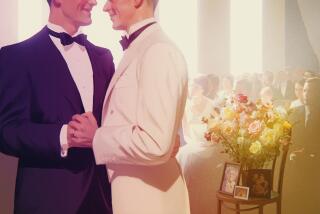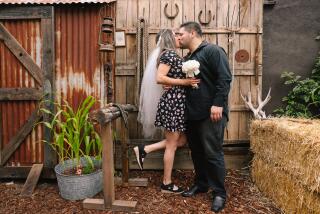Kerplunk! : What Is It About Weddings That Floors People?
- Share via
It was one of those memorable nuptial moments: “Susan,” said Richard Casselberry, facing his bride, “take this ring as a sign of my love and fidelity in the name of the Father, the Son and the Holy Spirit. . . . Father, I am going to pass out.”
The bride tried to catch the groom, but the dead weight was too much. “Help me!” she cried, and the best man came to the rescue.
Five minutes later, after a glass of water and some fresh air, the revivified groom returned.
“Then we had to go through the Mass and all,” said Susan. “Needless to say, the priest spoke pretty fast.”
Something about weddings makes people faint. Oh, not everyone (“Let’s face it,” said wedding gown designer Susan Lane, “the audience is sitting down.”), but Wedding Day swoons are not the least bit rare. Usually, only a fainter’s dignity is bruised because others can see the swaying that signals an impending swoon and act accordingly. But sometimes an injury occurs. One wedding consultant said she recently saw an usher break his jaw when he fainted.
Chris Evans, owner of Bridal Expo, a West Coast trade show, has witnessed the downing of at least four grooms over the years.
“I was at a wedding in Fresno, and the guy started swaying,” said Evans. “Two ushers grabbed him, helped him sit down and got him some water. At the end, the minister said, ‘Suzy and Bob, whether you like it or not , I now pronounce you man and wife.’ As he stepped down, his knees completely gave out and the bride and best man dragged him down the aisle. There were two little lines where his heels dragged across the floor.”
Evans has a theory on why some grooms come unglued: “I think it has to do with the macho guy routine. It is a real tender, real gentle moment, and maybe the guy doesn’t know how to respond. So instead of getting emotional, he just faints.”
Lane, who owns Country Elegance, a Toluca Lake bridal store, said some of the betrothed don’t even wait for the magic day before taking a fall.
“I have been designing for 25 years, and we have a bride faint in the dressing room at least once every six months,” she said. “Sometimes we just hear a clunk! --’Uh oh, there goes another one.’ It’s a stress thing. Plus, they go on these diets and haven’t eaten in weeks.”
It was indeed the bride who took a tumble down a short flight of stairs when 17-year-old Carol Pineda tied the knot in a stuffy Catholic church in Pasadena, Tex., in 1972.
“I had a history of passing out in church when the candles were burning,” said Pineda, now 36. Her wedding was no exception: “I looked at my maid of honor, who was fanning me, and said, ‘I am gonna pass out.’
“As far as I know, I never did say, ‘I do,’ ” said Pineda. “When I came to, I was married. There was no kissing the bride either.” The marriage outlasted the bruises by 15 years.
Vin Di Bona, executive producer of “America’s Funniest Home Videos,” says the show has received at least 1,500 submissions featuring such wedding mishaps as fainting, falling, slipping and swooning. In fact, Richard Casselberry’s tumble in April, 1984, won second place on the first episode of the show. (Two children later, the Louisiana couple is still happily married.)
“We have brides fainting, grooms fainting, best men fainting, altar boys fainting,” said Di Bona. “We don’t have any ministers or priests fainting yet. We have one bride who fainted three times into the arms of her groom.”
If June is the month most associated with weddings, August is the month most associated with wedding wooziness, said Mary Barnett, a Costa Mesa wedding consultant. “Usually it’s because the place they are having it, be it a small church or a tent, doesn’t have the proper ventilation. They are emotional and they don’t have all their faculties.”
There are several reasons people faint at weddings, said psychiatrist Howard Jay Cohen of Alexandria, Va. The causes can be emotional or physical. But a faint is not the same as being unconscious, he added, because fainters are generally awake the minute they hit the ground and they immediately start to feel better.
“People who are self-conscious in front of a crowd or who have great fear of crowds can have anxiety that manifests as dizziness, palpitations, sweating and tremulousness,” said Cohen. This is panic, he said, which results when the body releases adrenaline, which causes a surge of anxiety followed by the physical symptoms.
“Then you start to hyperventilate, and that gives a sense of lightheadedness,” he said. “Most of the problem is that people don’t actually faint, they have a fear of fainting.”
And if you worry too much about passing out, you just might.
“Anticipatory anxiety can build and build to the point that when you finally go down the aisle, it might precipitate a reaction,” Cohen said.
Another emotional cause is in the category of a “hysterical” response.
“Let’s say an older (unmarried) daughter is attending the wedding of a younger sibling,” said Cohen. “She feels out of place, like she should be up there. She may faint in a hysterical way: ‘I don’t want to be here. I can’t face it.’ ”
Physical reasons include pressure on the neck from a too-tight tie, dehydration caused by heat and too much alcohol or hypoglycemia (or low blood sugar caused by not eating).
What does not cause fainting, said Cohen, is locked knees or the smell of burning candles.
“People blame all kinds of emotional reactions on all kinds of things,” he said. “More often than not, there is some bigger emotional issue for this person than they (are) willing to admit to.”
No one is sure why one of Melanie Gold’s eight bridesmaids passed out six weeks ago in the middle of the traditional seven blessings said at the end of a Jewish wedding. The bridesmaid had never fainted before, but the Malibu evening was cool, the wedding took place outside and she was shivering in her off-shoulder dress.
“I turned around and saw three of my bridesmaids down,” said Gold, 32, a La Jolla attorney. “Then I saw two of them were helping Linda. She was the one who had helped me and been with me all day, and I think I transferred all my stress to her.”
(She had heard of wedding faints before, said Gold. It is a family joke that her parents eloped because her father had once witnessed the fainting of a groom and didn’t want to suffer the same fate.)
The rabbi who performed the ceremony, Mordecai Finley, first noticed a buzz in the audience, then saw that a bridesmaid had fallen.
A former Marine with first-aid training, Finley made sure the bridesmaid was not bleeding and then checked her breathing, which seemed normal.
“As soon as I saw she was in no mortal danger,” said Finley, “I went back to the microphone. I said, ‘That fourth blessing gets ‘em every time.’ They laughed. You learn that a little bit of humor in the right place puts everyone at ease. But they don’t prepare you for this in rabbinical school, I’ll tell ya that.”



